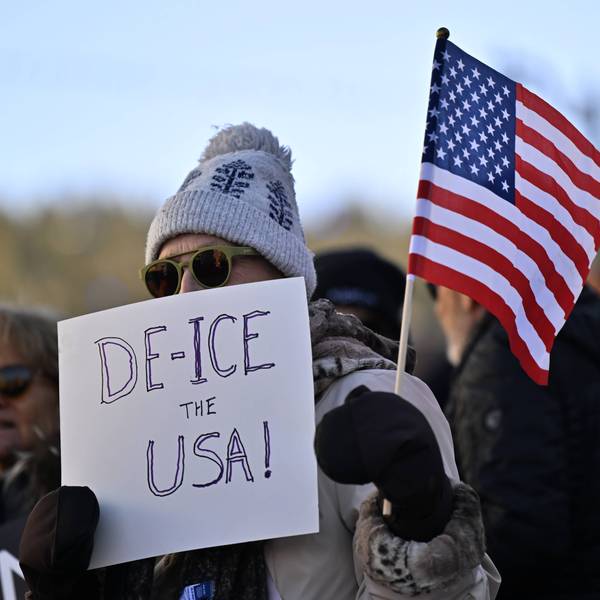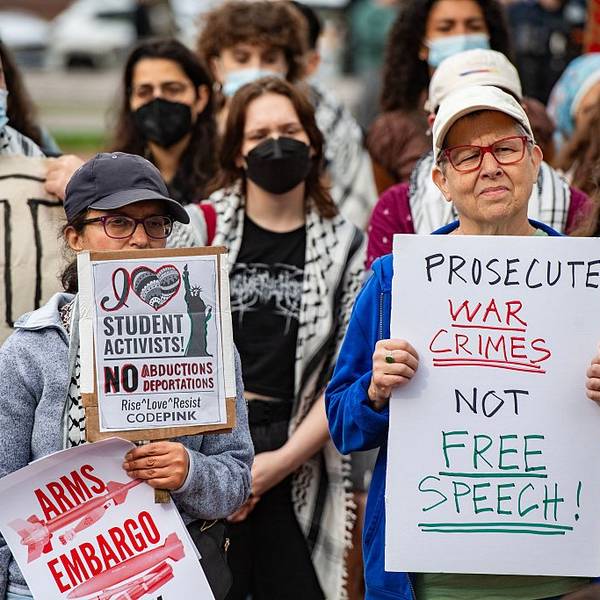As the president continues to go to bat for his Muslim ban, the Trump administration has put in place a new questionnaire for visa applicants, which critics say will enable discriminatory profiling and chill free speech.
According to Faiz Shakir, American Civil Liberties Union (ACLU) national political director, the "invasive questionnaire" marks "another front in the Trump administration's attack on immigrants and communities of color."
It asks (pdf) applicants for biographical information including travel, address, and employment history going back 15 years, as well as social media information for the past five years.
Reuters reported Thursday that the supplemental questionnaire will be given to applicants "who have been determined to warrant additional scrutiny in connection with terrorism or other national security-related visa ineligibilities," according to the State Department.
The news outlet adds that it "was approved on May 23 by the Office of Management and Budget [OMB] despite criticism from a range of education officials and academic groups during a public comment period."
For example, a joint letter (pdf) from over 50 academic organizations including the American Association for the Advancement of Science, the American Psychological Association, and the National Association of Mathematicians sent to the OMB this month states that it
provides insufficient information regarding the criteria for identifying those required to complete the supplemental form, the impact of unintentional incomplete disclosure of information, such as social media presence, or remedies for correcting information initially provided. These additional questions could lead to unacceptably long delays in processing, which are particularly harmful to applicants with strict activity timeframes or enrollment deadlines. Additionally, there is no information regarding the longer-term use, retention, or privacy protections for the information provided.
Numerous other organizations including the Electronic Frontier Foundation, the Center for Constitutional Rights, Human Rights Watch, and New America's Open Technology Institute also outlined their concerns and called on the OMB to abandon the vetting changes.
Among their concerns were that asking for 15 years-worth of data "will be time-consuming and potentially impossible to comply with." And the social media demand, the groups said, "is fatally ambiguous and will have a deleterious impact on the speech and privacy of the applicants as well as the Americans with whom they communicate."
They added: "The history of the vetting procedures also suggests the intent [of the collection is] to target Muslims."
The Guardian's editorial board also argues that "the suspicion is inevitably that [the changes] will be directed primarily at Muslim travelers." But, it continues
That is not the only reason to find them obnoxious. Their application will be arbitrary and their effect will be to allow for the arbitrary deportation of many of those who fill out the form, since even entirely honest candidates are likely to make a mistake when asked for information so detailed and so likely to be forgotten over time.
They add:
Surveillance capitalism merges with the surveillance state in a way that combines two of the dystopian trends of classic science fiction. The data that's being collected was after all created for enjoyment, and is being used for surveillance: Brave New World meets Nineteen Eighty-Four. But in both those dystopias the ruling elite, although ruthless, was also competent. That is not the impression given by the unscrupulous blunderers of the Trump government. In an effort to extend the range of their own hard power they are hacking away at American soft power, which depends, among other things, on the trust that foreigners have in the commitment of the U.S. to its own founding ideals.
ACLU's Shakir also criticized the lack of "clarity as to when or to whom [the new questions] will apply, which will likely result in discriminatory profiling and inconsistent and ineffective results. The government provides no parameters for social media vetting, raising concerns about the privacy and free speech rights of U.S. citizens and residents. The government provided the public with little to no information and without an adequate opportunity to comment on a vetting practice that will impact people in the United States and around the world," he stated.
Engadget noted that a social media information request began before President Donald Trump took office, despite concerns over threats to privacy and free expression raised by rights groups. "Last June, the Department of Homeland Security requested that such questions go on visa applications. They were approved in December, but only for those applying for visa waivers."



